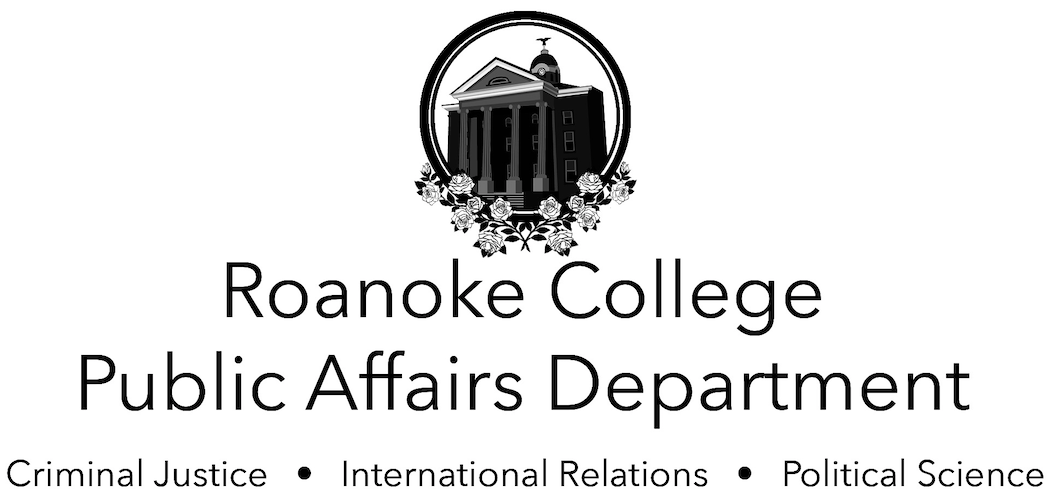A new year brings new minds to Roanoke College. Bright, enthusiastic, and sometimes slightly timid freshmen bring their eagerness to learn and explore to campus, and in their first year they will learn the dos and don’ts of navigating college life. By their final year, these once native college freshmen will have been guided down the path of academic success with the help of brilliant and selfless faculty and staff.
My name is Michaela McKinney and I am the student editor for the Department of Public Affairs Blog. I recently interviewed two graduates from the department to see what they have been up to since graduation. I gained insight into the factors that have contributed to their success and offered them the chance to give advice to new students, as well as those that are getting ready to graduate.

Emma Von der Lieth graduated with a degree in International Relations. She is currently working at VACORP, a Risk Management/Insurance Company in downtown Roanoke, as the Project Coordinator in the Project Management department. She describes the main task of her job to be assisting her Project Manager with various projects, such as data migration and implementing new software systems, while also helping to facilitate communication amongst project teams by taking notes during meetings and creating task lists to keep teams organized.
Margaret (Maggie) Strakna graduated with a degree in Criminal Justice. Right after graduation, she spent a week in Paris eating cheese, drinking wine, and breaking her ankle… so most of her summer was spent recovering from that. Maggie started her Juris Doctor at the University of Maryland, Baltimore Francis King Carey School of Law, which she says has been tough, but loves it and has already learned so much in just a short period of time.
When asked, ‘How well did the Department of Public Affairs prepare you for your plans after graduation?’
Emma spoke highly of her experience,
“[The department] has been so supportive of me, especially in my research endeavors. They were helpful after graduation in that they provided me with funds so that I was able to present my research in Greece, and I am still working with one professor to get my research published”.
I asked Emma about her experience presenting at The Migration Conference in Athens, Greece, where there were presenters from all over the world, including Australia, Finland, Turkey, Zimbabwe, and Jordan.
“I learned about the immigration laws and migration patterns in several different countries. My research is about sexual violence during the Syrian Civil War, and sexual violence is one of the main reasons why people are fleeing Syria, so it is related to migration in a kind of round-about way. I sat on the Gender and Migration panel along with a professor and two Ph.D. students. In fact, I was the only undergraduate student presenting at the conference.
This really goes to show how valuable a Roanoke College education is. I really do not want to sound egotistical here, but when I told others at the conference that I was not working on a Master’s or Ph.D., they were really shocked. Roanoke College may be small, but the education is incredibly unique in that I can sit alongside professors and Ph.D. students and produce work that is on their same level. I really owe this to my professors in the Public Affairs Department because I would not have achieved this success without them.”
Maggie also had positive remarks about the department and her experience,
“I could not have asked for Public Affairs to prepare me better for law school! I was certainly someone who complained a lot about the rigor of my classes and the amount of reading/work I was doing, but it created as close to a seamless transition between undergrad and law school as I think is possible. The liberal arts experience as a whole at Roanoke has leant itself well to my legal studies as well. There’s a saying that legal questions can be answered by anyone with a few hours and a library card, but my liberal arts education has given me the knowledge of why those answers are the way they are and strengthened my ability to apply what I learn from one case, statute, etc. to other situations”.
I asked both women if there was anyone within the Roanoke College community that helped them in their efforts to peruse their post-graduation plans.
Emma expressed gratitude towards all her former professors, specifically,
“the ones that really stand out to me are Dr. Snow, Dr. O’Keef, and Dr. Morris. I think they saw a lot of potential in me and helped me to reach that potential. They pushed me even when I didn’t necessarily want to be pushed, but I’m really thankful for that now”.
Maggie explained how the support and guidance she received from her professors was vital to her academic success. She specifically recalled her experience with several professors,
“Dr. Hoffman was a huge support for me as I was trying to adjust to the many changes I was experiencing freshman year. Professor Brogan was always willing to give me both the encouragement and complete honesty I needed. Dr. Peppers was an excellent resource for specific information and advice about law school applications and was just an overall amazing advisor. Mike Pace has always been incredibly supportive of my dream of going to law school. Right after I put in my deposit for Maryland, we had a really long conversation about the law school admissions process and my plans going forward, and reflecting on all of that was a huge reassurance that I was making the right decision. [And] Dean Fetrow, [who] taught my Criminal Procedure class how to read and brief cases; I cannot express enough how much of a leg up I had coming into law school by already having those skills”.
Both women were also gracious enough to offer some advice for those students new to the department and to those that are graduating soon.
Emma urged new students to build positive relationships with their professors early on, “it will be invaluable later in your college career, and even after you graduate”. She also stressed the importance of working hard and putting forth your best effort, while also encouraging students to let loose every once in a while, “don’t forget to have a little fun, too! Balance is everything, so if you can master both work and play, you will see the most success”.
Maggie’s advice for new students stems from the opportunities she took advantage of during her time at Roanoke. She was head referee for Battle of the Bast, which she said not only gave her creative problem-solving skills but has also made for a great icebreaker when she is meeting new people. “You’d be surprised how much even the random, odd things you do at Roanoke will help you later in life.”
Her advice for potential law students, “whether you have years left or are in your final semester, get yourself involved in the law in every way you can. Take Juvenile Delinquency so that you can observe in the local juvenile courts; go down to one of the courthouses and watch what’s going on; attend every event possible on campus where you can learn something about the law and the justice system”. Maggie strongly suggested reaching out to those currently attending law school and to the many lawyers we have working on campus, “we are so lucky to have several people at Roanoke who have gone through law school and are willing to give students advice… I haven’t met anyone yet who isn’t willing to talk about their law school experience (everyone is welcome to reach out to me)”.
And for those about to graduate… Emma gave a few suggestions,
“1) Do not panic. I remember my friends and I would be in a constant panic all the time, applying for jobs every hour of the day and freaking out when we never heard back. It is rare to find a job while still in college. And if you do find a job, it will probably be in a field you weren’t expecting or you don’t want to be in. Remember that you are not going to be stuck in your first job forever. Experience is still experience, no matter where it is from. 2) Use your professors for contacts and career advice. Also, use recent graduates and check LinkedIn to see if any alumni work in the field or company that you want to work in. Call them up, or send an email. If they can’t help you get that interview, they will most likely tell you what to do to be a good candidate for the future. 3) Relish in the time you have not working… take time to travel, be with your family and friends, and do what you love before you start working 24/7”.
Maggie also advised taking the time to really consider your post-undergrad options, you never know what direction life will take you,
“if you aren’t 100% sure you want to go to law school, don’t do it straight out of Roanoke. Take a year off to travel, work, or do something else that will give you time to really consider if it’s what you want to do. Law school takes all types; in just my section we have an Army veterinarian, an accountant who also has a chemical engineering degree, and several other people who did non-legal things before law school. You won’t be at a disadvantage if you eventually decide that you definitely want to go, and it’s too expensive, stressful, and time-consuming of an experience to just go and figure out once you get there if it’s what you want to do”.
Well, it is obvious that these two young women have very bright futures ahead of them. I am so grateful that they took the time out of their busy days to give readers some honest and thoughtful advice.
Best of luck to you both!

